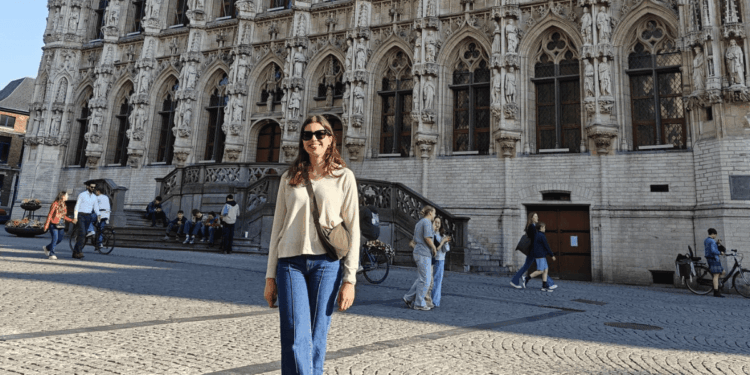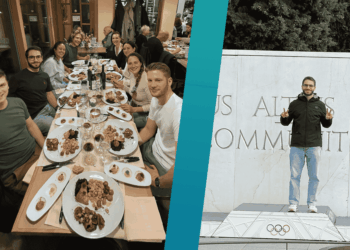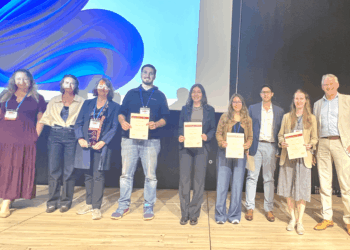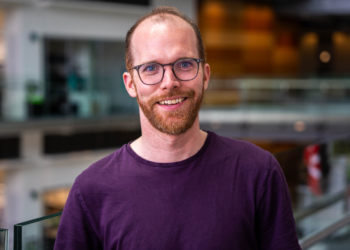Ana Baião is a PhD student at the Institute for Research and Innovation in Health (i3S), University of Porto in Portugal who received an EACR Travel Fellowship to visit and work at the Laboratory of Digestive Oncology, KU Leuven in Belgium between May and July 2025.
The EACR, with support from Worldwide Cancer Research, provides Travel Fellowships of up to €3,500 to enable early-career cancer researchers to gain new skills through a short-term visit to a lab or research group in another country.
You can read about other Travel Fellows and their experiences here.
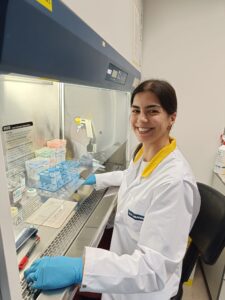 Name: Ana Baião
Name: Ana Baião
Job title: PhD student
Home institute: Institute for Research and Innovation in Health (i3S), University of Porto in Portugal
Host institute: Laboratory of Digestive Oncology, KU Leuven in Belgium
Dates of visit: 01 May – 31 July 2025
Research: Colorectal cancer is one of the deadliest cancers, partly because current treatments are not effective enough and can cause strong side effects. My research focuses on developing a new therapy that uses nanoparticles, to deliver chemotherapy directly to the cancer cells that display a specific “flag”. By doing this, the treatment becomes more precise and less harmful to healthy cells. I am also combining this approach with immunotherapy, which helps the body’s own immune system fight the cancer. Together, these strategies aim to create safer and more effective treatments for patients.
Why did you decide to apply for an EACR Travel Fellowship?
I applied for the EACR Travel Fellowship because it represented a unique opportunity to broaden my international experience during my PhD. On a personal level, I was seeking growth: living and working abroad for a few months was a challenge I wanted to embrace, as it would help me expand my horizons beyond the comfort of my home institution. Scientifically, my research group is focused on nanotechnology, and I felt it would be very valuable to immerse myself in a lab with a completely different focus: colorectal cancer biology and bioinformatics. This contrast allowed me to step outside my scientific comfort zone and approach my project from a new perspective. Beyond these benefits, I also saw the fellowship as a platform to strengthen my career development, foster international collaborations, and gain visibility within the cancer research community, all while experiencing personal growth that will shape me as both a scientist and an individual.
Why did you choose the host lab?
For personal reasons, I wanted to spend time in Belgium, and my co-supervisor recommended the Laboratory of Digestive Oncology at KU Leuven. Led by Professor Sabine Tejpar, the lab has internationally recognised expertise in colorectal cancer, patient-derived organoids, and immuno-oncology, and these areas complemented my background in nanomedicine. Their well-established methodologies in organoid culture and cancer-immune microenvironment offered exactly the expertise I needed to make my work more clinically relevant. At the same time, KU Leuven’s strong reputation and highly collaborative environment made it an ideal place to grow both technically and personally. This was not only a match for my project but also an opportunity to challenge myself in a new scientific and cultural setting.
Was the host institution very different from your own?
The host institution was different in a few meaningful ways. The laboratory is located in a building that houses several research groups and has a direct connection with the hospital, which makes working with human samples more immediate and integrated into clinical practice. Another distinctive aspect is that the lab is part of KU Leuven and embedded in a strong academic environment. Leuven itself is a small but highly academic city, with a vibrant student and research atmosphere, which I found inspiring. Experiencing this close connection between research, hospital, and university gave me a new perspective on how translational and academic environments can complement each other.
Can you summarise the research you did or what you learned on your visit?
During my visit, I focused on integrating patient-derived colorectal cancer organoids into my project. I learned how to establish and optimise organoid cultures, ensuring their reproducibility and long-term viability, which was an essential new skill for me. I also received training in advanced co-culture systems with immune cells. In addition, I gained hands-on experience in assessing drug response profiles of organoids, including testing my own therapeutic approach. This gave me valuable insights into how my strategy might perform in patient derived settings. Overall, the visit not only expanded my technical expertise but also broadened my scientific perspective, which will be critical for completing my PhD and shaping my long-term career in cancer research.
Did you take part in any interesting local activities?
Yes, I made the most of the opportunity to explore Leuven and its surroundings! I really enjoyed walking through the city, with its mix of medieval architecture and vibrant student life, which gave it a unique atmosphere. I attended local cultural events and, of course, tried some Belgian specialties such as waffles, frites, and local beers, which were definitely memorable. On weekends, I visited Brussels, Bruges and Ghent, which gave me a broader experience of Belgian culture, from art and history to gastronomy. These experiences enriched my stay, being able to discover a new country and culture
What was a personal highlight of your trip?
A personal highlight of my trip was the chance to immerse myself in a lab entirely dedicated to the biology and bioinformatics of colorectal cancer. Coming from a nanotechnology-focused group, this shift in perspective was eye-opening and pushed me to grow scientifically. Equally meaningful, however, was the lifestyle I experienced while living in Leuven. Being in the centre of Europe allowed me to easily explore new cities and cultures, and I particularly enjoyed the daily habit of going everywhere by bike, even commuting to the lab! It gave me a sense of freedom and tranquillity that I will always associate with this period of my PhD. Altogether, the combination of professional growth and personal discovery made the experience truly memorable.
Want to find out more?
If you are interested in applying for the Travel Fellowship scheme, please click here for more information: EACR Travel Fellowships


